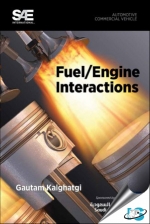Tab Article
Conventional fossil fuels will constitute the majority of automotive fuels for the foreseeable future but will have to adapt to changes in engine technology. Unconventional transport fuels such as biofuels, gas-to-liquid fuels, compressed natural gas, and liquid petroleum gas will also play a role. Hydrogen might be a viable transport fuel if it overcomes barriers in production, transport, storage, and safety and/or if fuel cells become viable.
This book opens by considering these issues and then introduces practical transport fuels. A chapter on engine deposits follows, which is an important practical topic about how fuels affect engines that is not usually considered in other books.
The next three chapters discuss auto-ignition phenomena in engines. The auto-ignition resistance of fuels is the most important fuel property since it limits the efficiency of spark ignition engines and determines the performance of compression ignition engines. Moreover, the manufacture of fuels is primarily driven by the need to meet auto-ignition quality demands set by fuel specifications. The final chapter considers the implications for future fuels.
The book covers the many important ways that fuels and engines interact and why and how fuels will need to change to meet the requirements of future engines, as well as the implications for fuels manufacture and specifications.


